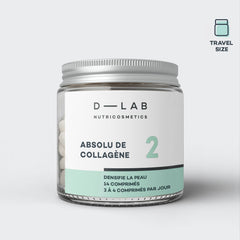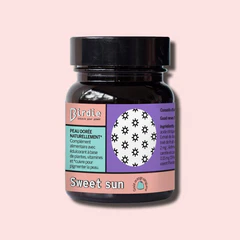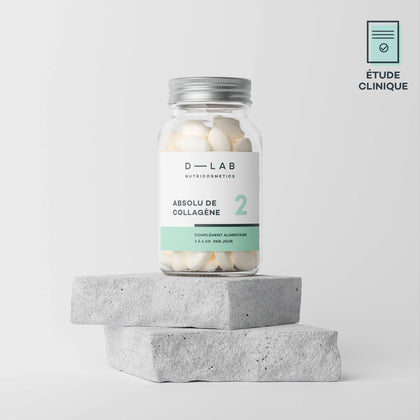
What is collagen?
Collagen is the most abundant structural protein we possess, and it plays an incredibly important role.
Découvrir les compléments alimentaires à base de collagène de D-LAB.
Collagen is present in our skin, hair, nails, intestines, joints, tendons and even bones. It's this protein that gives your skin its elasticity and firmness. You know, that little "bounce" that gives us that youthful, luminous look.
It also acts as a kind of "glue" that holds our cells together. So, if you want your skin to stay supple, your joints to function without pain, and your intestines to assimilate properly, collagen will be indispensable!
What exactly is collagen?
Collagen's structure is characterized by a specific amino acid sequence, rich in glycine, proline and hydroxyproline. Its distinctive shape takes the form of a triple helix, also known as an alpha triple helix, in which three polypeptide chains intertwine tightly. This triple helix pattern gives collagen its stability and strength, essential for the solidity of connective tissue.
If you would like to find out more about benefits of collagenit's this way :)
The role of collagen
We've already seen that collagen is crucial for the skin, but that's not all! This magical protein has even more to offer our bodies.
1. For the skin :
- Maintaining elasticity: Collagen is a structural protein that makes up a large part of the dermis, the deepest layer of the skin. It ensures the skin's firmness and elasticity by giving it structure and supporting collagen and elastin fibers.
- Hydration: Collagen helps retain water in the skin. Well-moisturized skin looks younger and more radiant.
2. For hair :
Although collagen is not part of the hair structure like keratin, it plays a vital role in strengthening hair follicles. It improves hair resistance, promoting a healthy hair environment and protecting against damage, for stronger, thicker, more resilient hair.
3. For slimming :
Collagen is an important component of muscle tissue. By maintaining good lean muscle mass, collagen can help increase basal metabolic rate, which can aid weight loss and weight management.
4. For the intestines :
You may have been surprised to learn that collagen can be beneficial for our intestines. Collagen is an important part of the intestinal lining. It helps maintain the integrity of the intestinal mucosa by forming a protective barrier against toxins, bacteria and other harmful substances, thus promoting healthy digestion. Inflammation is reduced, which can be beneficial for people suffering from digestive disorders such as irritable bowel syndrome (IBS) or Crohn's disease.
5. For flexibility :
Collagen also contributes to our body's flexibility. It is present in our tendons and ligaments, enabling joints to move smoothly. That's why it's so important for athletes and active people. If you want to stay flexible and avoid joint pain, collagen is your ally.
Studies suggest that collagen supplementation can help reduce inflammation in joints, which can relieve the pain and discomfort associated with joint problems such as osteoarthritis.
Collagen takes care of our skin, hair, joints, intestines and flexibility. That's why it's become an essential supplement for many people!
The evolution of collagen over time
From the age of 25, its production decreases and the signs of aging appear:
- wrinkles and fine lines, sagging skin, loss of volume and elasticity.
- the body: joint and tendon problems, etc.
- poor assimilation and digestive problems
And from the age of 40 onwards, the body creates around 1% less collagen every year. This means the body has less collagen to support skin, joints and connective tissue.
By the age of 50, we have used up half our collagen capital.

It is possible to limit this phenomenon by supplying the body with quality collagen to help make up for this loss.
It's essential to choose a hydrolyzed marine collagen with a low molecular weight, vitamin C and, if possible, a clinical study! Just like collagen selected by D-LAB!
Collagen from D-LAB
D-LAB has selected the most interesting and powerful collagen on the market!
French marine collagen, hydrolyzed collagen with low molecular weight and clinically proven anti-aging results!
D-LAB's collagen is distinguished by its marine origin, a form recognized as the best assimilated by the body.
Thanks to a meticulous hydrolysis process, we break down collagen into smaller particles, with a molecular weight of around 2,000 Da, ensuring optimal absorption.
This unique formula, composed of 94% type I marine collagen and 6% elastin fibers, precisely reproduces the proportions essential to skin health. From as little as 2 grams a day, our collagen has proven remarkably effective in reducing the depth of wrinkles and restoring skin hydration. The dermis is more supple and the skin is tightened.
In an ethical and responsible approach, our collagen comes from MSC-certified French wild fisheries, guaranteeing not only its quality, but also our commitment to sustainability.

To conclude
At D-LAB NUTRICOSMETICS, we believe in the power of inner beauty to radiate outwards.
Collagen is much more than just a protein; it's the secret to the youth and vitality of our skin, hair and overall well-being.
Investing in our collagen health from an early age is a gesture of love towards our bodies. By taking a proactive approach and integrating D-LAB NUTRICOSMETICS collagen supplementation into our daily routine, we can preserve our youthful capital and support our well-being at every stage of our lives.
What is the molecular weight of D-LAB collagen?
All our collagen-based formulas contain the same hydrolyzed type I marine collagen with a molecular weight of around 2000 Da. This low molecular weight enhances its absorption, bioavailability and ability to reach target tissues to reinforce its beneficial effects on skin, joints and many other body tissues.
Our Pro-Collagen Souplesse contains another type of hydrolyzed marine collagen, but type I and II without elastin, with a molecular weight of around 2000 Da.
What is the collagen hydrolysate used in your formulas?
Our formulas use collagen hydrolysate which can be absorbed by the intestinal barrier. These peptides and free amino acids, less than 0.5 Kda in size, are found in the bloodstream after digestion and are known to be efficiently absorbed by the intestinal barrier (Iwai et al., 2005).
Why do you include vitamin C in your collagen-based formulas?
Vitamin C is associated with our products, as it is essential for collagen synthesis processes. It acts as a necessary co-factor for the enzymes (prolyl and lysine hydroxylases) involved in collagen synthesis. As such, it helps maintain skin homeostasis.
Read our article "Myths and facts about the effects of collagen"to find out more :)





